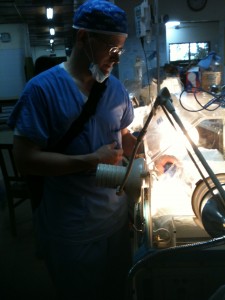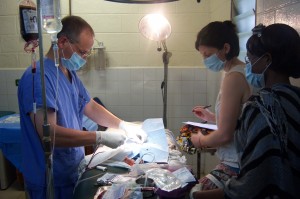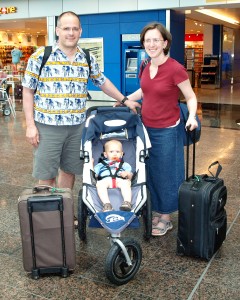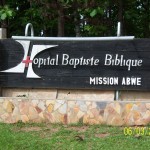If one thing is true for missionary medicine is that there is no shortage of interesting cases – hepatitis B, miscarriage, ectopic pregnancy, sepsis, mandibular mass, congestive heart failure, placenta previa, severe pre-eclampsia, hyperthyroidism, new onset atrial fibrillation, colles fracture, tib fib fracture, etc. –and this is only day #16. The theme over these last two weeks seems to be congestive heart failure and strokes.
The difficulty of the cases are compounded by the fact that the Togolese seem to come to the hospital only if they are really sick. Having high blood pressure is not sick. Having a stroke is not sick. Having a stroke and not improving over the following 12 to 24 hours is sick. Having a diagnosis of congestive heart failure and being on meds is not sick. Having a diagnosis of congestive heart failure, being off of meds for months and having difficulty breathing is sick.
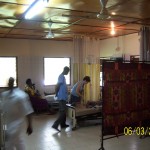
Intensive Care Unit
Of all the cases one sticks in my mind today, the 47 year old mother who was cooking dinner the night before, sat down and fell over. Family helped her up and immediately noticed drooling, left sided weakness and loss of speech. We saw her the next day at around 10 am. A quick physical confirmed the family’s observation and added two additional findings, unequal and non-reactive pupils and decreased consciousness. She was sick, really sick.
In the US there is a well-established stroke protocol that includes CT scan, neurosurgery consult, TPA, symptomatic treatment including sedation, hyperventilation, risk reduction and last ditch efforts. Here we have only symptomatic treatment and risk reduction.
Within a short period of time, the 47 year old mother’s blood pressure started to rise, her pulse started to slow and she stopped breathing. Things were going in the wrong direction. As she changed we did what we could. We attempted to treat her blood pressure with labetalol and hydralazine, we gave her mannitol and we bagged her (breathed for her).
As we are resuscitating her, I know she will not survive, but I am uncertain. I know the problem with her is cerebral pressure, but I am uncertain. I know we are doing what we can for her, but I am uncertain. I know what she needs above all is a craniotomy/external ventricular drainage to relieve the pressure in her head, but it is too late, I think, I am uncertain.
After 30 minutes of resuscitation that include a bedside prayer, we stopped and she stopped. But I could not.
Now comes the questions and tears again, what did we do, what didn’t we do, should we have done something different, are we competent, and should we be here? With every loss we are left to ponder our contribution. We are left to wonder if the outcome would have been different in the US. We are left to ponder the difference between missionary and American medicine.
Resources is the obvious answer. Certainty is the other answer.
Going to the doctor in the US with a problem will result in tests, consultations and follow up visits. At the end of it all you will be given a diagnosis and/or prognosis with certainty. This process can take a matter of hours to weeks to months. The speed at which it is done is directly related to how sick you are. The sicker you are, the quicker the test and consults are done. Built into this process, unintentionally, are the results and time. Doctors and families alike, through results and time, come to a peace –a general understanding of the prognosis of the patient at hand. And when a patient dies the doctor and family can reflect and justify that they did all they could.
Missionary medicine is different. We have uncertainty. Did the 47 year old mother with a stroke have a general diffuse bleed that could have benefited from an external ventricular drain and or a focal bleed that could have benefited from a simple burr hole? I do not know. Can we do it here and should we have tried? I do not know. Had we started the mannitol sooner, would we have made a difference? I do not know. Would time on a ventilator have made a difference? I do not know. Did I give up to early? I do not know, I am uncertain.
Lord we pray for strength and peace in the encounters and decision we make.
We pray for understanding and wisdom in the disease process we treat.
We give thanks for the people you have surrounded us with.
We are standing our Your Shoulders
We would like to take this time to say thank you to everyone for their kind words and support. Yes we are in Togo, but we here only because we are standing on your shoulders. We could not be here without your support.
A special thanks to the attendings at Tacoma Family Medicine Rural Fellowship Program in Tacoma Washington, Saint Elizabeth OB fellowship in Edgewood, Kentucky, and Dr. Stocks in Missouri for continuing to take our calls and answering our questions.
A special thanks Dr. Evans (Quincy Illinois) for putting us in contact with Dr. Sullivant and for the Nephrotic Syndrome consult. Thanks to Dr. Sullivant (Quincy Illinois) for a crash review of stroke and the treatment there of.
A special thanks to Samaritan’s Purse for giving us this opportunity to serve overseas through their Post Residency Program.
God Bless

